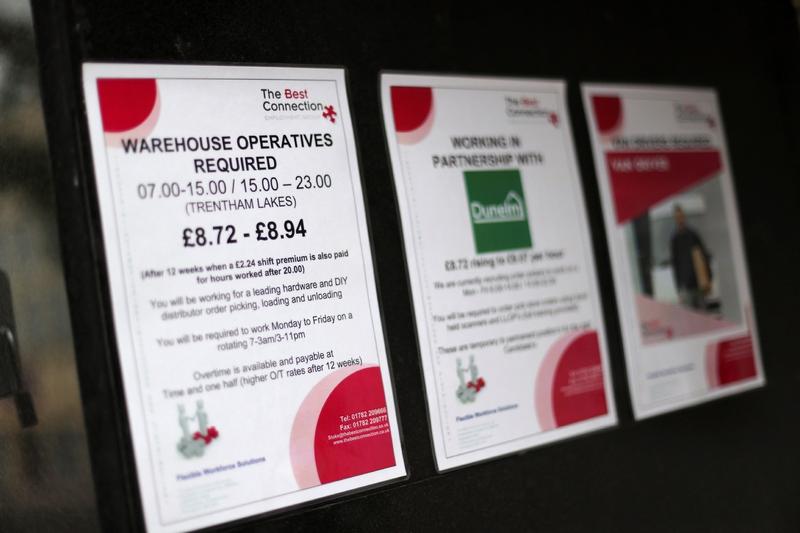 Advertisements for jobs are seen in a Job Recruitment Center's window, amid the coronavirus disease outbreak, in Stoke-on-Trent, Staffordshire, Britain on Aug 6, 2020. (PHOTO / CHINADAILY.COM.CN)
Advertisements for jobs are seen in a Job Recruitment Center's window, amid the coronavirus disease outbreak, in Stoke-on-Trent, Staffordshire, Britain on Aug 6, 2020. (PHOTO / CHINADAILY.COM.CN)
The devastating economic impact of the coronavirus has been underlined once again after the BBC recently reported that the number of companies in the United Kingdom that in June planned to cut 20 or more jobs was five times as high as the figure for the same time last year.
Companies shedding more than 20 members of staff are required by law to give the government notice. Through a Freedom of Information request, the broadcaster discovered that in June, 1,178 companies informed the government they would collectively be making more than 139,000 redundancies in England, Scotland and Wales. A year ago, the figure was just 345 companies losing 24,000 jobs.
Companies on the list this year include HSBC, aircraft manufacturer Airbus, Royal Mail and airport ground services group Swissport. Those companies notifying the government must wait at least 30 days before shedding workers, with longer terms for mass layoffs.
The worldwide slump in the aviation industry has continued this month, with British Airways becoming the latest company to announce significant redundancies, with 4,000 compulsory layoffs and 6,000 voluntary ones. In a post on its website, Britain's and Ireland's biggest trade union, Unite, called the actions of the airline "industrial thuggery" and said employees were being "forced out by company greed”.
Companies shedding more than 20 members of staff are required by law to give the government notice
ALSO READ: Figures reveal impact of virus on UK
Meanwhile, British Prime Minister Boris Johnson has spoken of there being a "moral duty" to have all children back in school when the new academic year starts in September.
Many have not attended school in person since lockdowns began at the end of March, and doubts have been raised about plans for everyone to return next month.
"This pandemic isn't over, and the last thing any of us can afford to do is become complacent," Johnson wrote in the Mail on Sunday. "But now that we know enough to reopen schools to all pupils safely, we have a moral duty to do so."
The educational, social and financial impact all meant it was vital children returned to classrooms as soon as possible, and for as long as possible, he said.
"Keeping our schools closed a moment longer than absolutely necessary is socially intolerable, economically unsustainable and morally indefensible."
Fears of another wave
With parts of Britain having had to introduce local lockdowns because of infection flare-ups, there are fears that there could be a renewed outbreak in the coming months, with the possibility of a more widespread lockdown being required.
In that eventuality, a Downing Street source said, keeping schools open would be a top priority.
"The PM has been clear that businesses including shops, pubs and restaurants should be forced to close first, with schools remaining open for as long as possible," the source said.
But senior figures in the education sector have greeted Johnson's words with skepticism.
"If the government is always on the back foot, putting us in the position of trying to then make some kind of sense out of their guidance, school leaders will do that, but it is a little bit rich I think to be hearing a prime minister say this is a priority," said Geoff Barton, head of the Association of School and College Leaders. "It should have been a priority right from the beginning."
Elsewhere in Europe, Norway is tightening restrictions to prevent fresh outbreaks of the novel coronavirus.
Since the pandemic began, the country has registered just 256 deaths by Sunday, one of the lowest figures in Europe.
As of early Monday, Europe has reported 3,562,774 confirmed cases with 216,426 deaths, according to the World Health Organization.
But an increase in the number of positive test results has led Norway's government to act decisively.
READ MORE: Johnson accepts lessons to be learned from UK's virus response
"I think most people have understood it now. The holiday is over," said Health and Care Services Minister Bent Hoie, as new regulations were announced.
All unnecessary overseas trips are now officially discouraged, and visitors coming into the country from so-called red countries must wear face masks until they return home.
The serving of alcohol after midnight in bars and pubs has also been forbidden indefinitely.
"There is a connection between alcohol consumption and how you behave," Prime Minister Erna Solberg said.
She also encouraged workers to work from home whenever possible.
"We recommend that employers arrange for half of their employees to have a home office, where this is possible. Reducing the number of people traveling by public transit during rush hour is important," she added.


